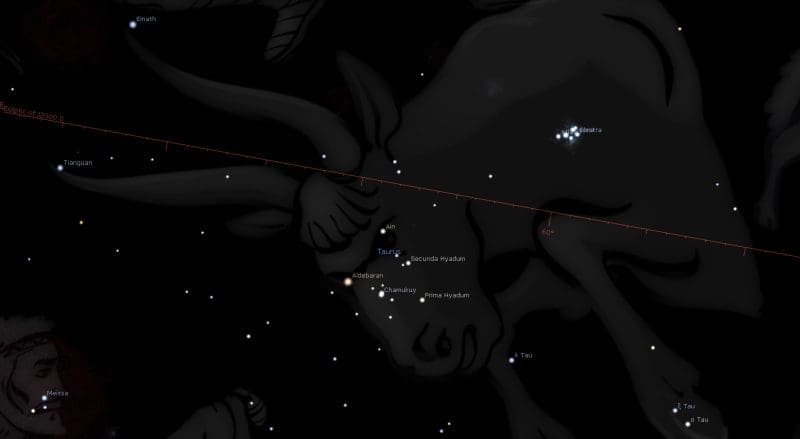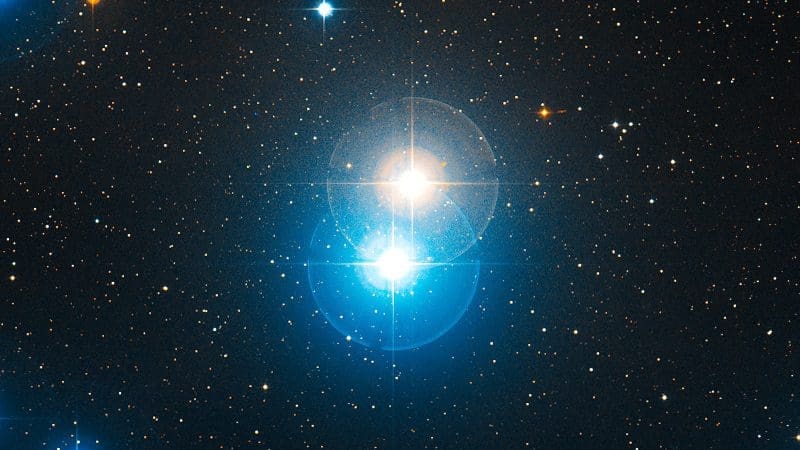Hyadum III at 07°57′ Gemini has an orb of 1°30′
The Sun joins Hyadum III on May 28
Fixed star Hyadum III, Theta Tauri, is a wide double star in the Hyades star cluster located on the face of the Bull, Taurus Constellation. Magnitudes 3.84 and 3.40, spectral types K0III and A7III.
The two components of θ Tauri are designated θ1 Tauri and θ2 Tauri.
- θ1 Tauri is Hyadum III with no official name.
- θ2 Tauri is Hyadum IV, officially named Chamukuy, a small bird in the Yucatec Maya language.
θ1 and θ2 Tauri have the same degree (07♊58 for the year 2000). So, for astrological purposes, I am using one star labeled Theta Tauri, Hyadum III (Chamukuy).
The Hyades contains hundreds of stars sharing the same age, place of origin, chemical characteristics, and motion through space. The five brightest of these are:
| 2000 | B | Name | Sp. | Mag. |
|---|---|---|---|---|
| 05♊48 | γ Tau | Hyadum I, Prima Hyadum | K0 | 3.65 |
| 06♊52 | δ1 Tau | Hyadum II, Secunda Hyadum | K0 | 3.76 |
| 07♊57 | θ1 Tau | Hyadum III | K0 | 3.84 |
| 07♊58 | θ2 Tau | Hyadum IV, Chamukuy | A7 | 3.40 |
| 08♊28 | ε Tau | Ain | G9 | 3.53 |
Some astrologers include α Tauri, Aldebaran, in the Hyades. However, Aldebaran is unrelated to the Hyades, as it is located much closer to Earth and merely happens to lie along the same line of sight.
In Greek mythology, the Hyades were the five daughters of Atlas and half-sisters to the Pleiades. After the death of their brother, Hyas, the weeping sisters were transformed into a cluster of stars that was afterward associated with rain.
| 2000 | 2050 | Fixed Star | Orb |
| 05♊48 | 06♊31 | Hyadum I | 1°40′ |
| 06♊52 | 07♊35 | Hyadum II | 1°30′ |
| 07♊57 | 08♊40 | Hyadum III | 1°30′ |
| 08♊28 | 09♊10 | Ain | 1°40′ |
| 09♊47 | 10♊30 | Aldebaran | 2°40′ |
Hyadum III Astrology
Fixed star Hyadum III has the spectral types A7 and KO, indicating the planetary nature of Venus and Mars.
The Hyades consist of six stars (α, θ1, θ2, γ, δ, and ε, Tauri) situated on the forehead of the Bull and marking the northern eye. According to Ptolemy they are of the nature of Saturn and Mercury; and, to Alvidas, of Mercury and Mars. Simmonite likens the Hyades to Mars but this is probably a misinterpretation of Ptolemy’s meaning. They give tears, sudden events, violence, fierceness, poisoning, blindness, wounds or injuries to the head by instruments, weapons or fevers, and contradictions of fortune. [1]
The Hyades as a group are violent and troublesome, causing storm and tempests both on land and sea. They have always been associated with rain (even China as well as Greece and Rome). Edmund Spencer calls them the “Moist Daughters”, and the stars have always had a favorable connotation regarding agriculture. Vivian Robson claims that Prima Hyadum is the chief star of the Hyades, but this is at variance with classical literature which gives this prominence to Aldebaran. [2]
The Hyades cluster of the rain stars bear out a Mars-Neptune character with a Uranian blend. Their influence is that of a staggering increase of the sexual urge; self-preservation, which could lead to greediness; sexuality; a dissolute life; excessive and licentious ways; and a striving for prestige leading to power politics. If this tendency is bridled, an increase in the positive sense can be the result, leading to tremendous success in life. When the pinnacle of the career is reached, the danger appears that the inherent nature may come again to the fore, and may, if uncontrolled, lead to failure and fall from power. With a connection to the Hyades, it is doubly important that power and strength must not be used to exploit other human beings. [3]
The Hyades are a small group of six stars including the Eye of Taurus (Ain). Greek mythology saw them as the daughters of Atlas and Aethra, major figures in the pre-disaster period of our history. Like their half-sister the Pleiades, they were a sorrowful group – understandably after seeing Father try in vain to keep the sky (Phaeton’s debris) up off the Earth – and they have long portended rain, to both farmers and seafarers. Of the Hyades overall, we can now add the note that these princesses of one of Earth’s most powerful rulers in the run-up to the Disaster would indeed have been among those required to communicate the news to a panic-stricken population and to exercise firm control over them. And that is very much the quality we find in this part of Taurus Constellation, now in Gemini decan 1 (5 to 10° Gemini Sign). [4]
Constellation Taurus
Ptolemy makes the following observations: “Those stars in Taurus which are in the abscission of the sign resemble in their temperament the influence of Venus, and in some degree that of Saturn . . . the stars in the head (except Aldebaran) resemble Saturn, and, partly, Mercury; and those at the top of the horns are like Mars.” By the Kabalists Taurus is associated with the Hebrew letter Aleph and the 1st Tarot Trump “The Juggler.” In all the ancient Zodiacs, Taurus is the beginning sign and marked the Vernal Equinox from about 4,000 to 1,700 B.C. [1]
The constellation was an object of worship in primitive cultures throughout the ages. To the ancient Egyptians, it was the bull-god Orissi, but according to R. A. Allen in Star Names and Their Meanings, the star was also worshiped by the Babylonians, Chinese, Druids, and some tribes of Amazon Indians. Its stars, according to Tetrabiblos are: “…like Venus along the line where the constellation is cut off [Taurus is represented as the head and fore-part only of a charging bull. These are the stars 5-Tau, 4-Tau, 3-Tau, 0-Tau, and 30-Tau.]: those in the Pleiades have the nature of the Moon and Jupiter; the one in the Hyades that is bright and somewhat reddish called Troch (Aldebaran) has a ‘temperament’ like that of Mars; the others (in the Hyades) like that of Saturn and moderately like that of Mercury; and those (stars) in the tips of the horns, like that of Mars.” With the exception of El Nath (constellation of the Charioteer), all the named stars in Ptolemy’s catalog of this constellation are in the Hyades and Pleiades. The Bull is now called Taurus (Tau) and traditionally presages the results of the beginnings of large political undertakings. The constellation also portends that which affects wild animals, especially those dangerous to man. [2]
Fixed Star Hyadum III Conjunctions
Ascendant conjunct Hyadum III: Injuries to the face, wounds, stabs, blindness, bad eyes, imprisonment. With the Sun or Moon, military captains, commanders, colonels of horses and emperors. [1]
Will Smith 0°08′, Queen Victoria 0°31′, Alan Turing 1°04′, Machine Gun Kelly 1°16′.
Descendant conjunct Hyadum III: Mark Ruffalo 0°35′, Patch Adams 0°50′ (and Sun), Bruce Lee 0°56′.
Midheaven conjunct Hyadum III: Disgrace, ruin, violent death, injuries to the face, wounds, stabs, blindness, bad eyes, imprisonment. With the Sun or Moon, military captains, commanders, colonels of horses and emperors. [1]
Bella Hadid 0°11′, Sarah Paulson 0°36′, Kenneth Copeland 1°27′, Roger Federer 1°32′.
Imun Coeli conjunct Hyadum III: Heinrich Himmler 0°06′, Pablo Neruda 0°23′, Whoopi Goldberg 0°27′, Khloé Kardashian 1°00′.
Part of Fortune conjunct Hyadum III: Albert Camus 0°06′, Joseph Goebbels 0°23′, Corey Feldman 1°03′, Halle Berry 1°17′, Christopher Reeve 1°24′, Henry VIII 1°29′ (and Venus, S. Node).
Sun conjunct Hyades: Evil disposition, disturbed mind, failure in study, muddled thinking, misfortune, murderer or murdered, death by blows, stabs, shooting, beheading or shipwreck. [1]
Patch Adams 0°04′ (and DC), Mel B 0°05′, Rudy Giuliani 0°05′ (and Uranus).
Moon conjunct Hyadum III: Tactful, fair ability, difficulties connected with writings, may forge the name of employer or friend but finally escape punishment and retain position, liable to sickness and disgrace, danger of blindness or eye injuries. [1]
Roy Orbison 0°15′, M. C. Escher 1°04′.
Mercury conjunct Hyadum III: Quick mind, resentful, hasty temper, broods over small troubles, favorable for gain. [1]
Marilyn Monroe 0°08′, Charles II of England 1°03′, Che Guevara 1°13′, Jane Roberts 1°20′, Jeffrey Dahmer 1°22′.
Venus conjunct Hyadum III: Many accomplishments, artistic, ability to write or paint, strong passions, which influence work. [1]
Henry VIII 0°07′ (and POF, S. Node), Salman Rushdie 1°10′, Malcolm X 1°21′.
Mars conjunct Hyadum III: Abrupt, brave, aggressive, courageous, lacks concentration. [1]
O. J. Simpson 1°11′, Keith Richards 1°13′ (and Uranus), John Wayne Gacy 1°18′.
Jupiter conjunct Hyades: Ambitious, dishonest, legal difficulties, quarrels with relatives, judicial sentence. [1]
Arthur Koestler 0°49′, Rudolf Hess 1°32′.
Saturn conjunct Hyadum III: Caution, forethought, omnivorous reader, scientific, success but little prominence, worry and annoyance from relatives. [1]
Connected with Saturn, the Hyades points to falls and accidents [3]
Bobby Fischer 0°39′, Dolores O’Riordan 1°10′, Dwayne Johnson 1°13′.
Uranus conjunct Hyadum III: Scientific, literary, artistic and mystical interests, unconsciously psychic, greatly influenced by environment, favorable for marriage after 35 and for gain and children, ill-health, seldom long life. [1]
Keith Richards 1°06′ (and Mars), Oliver North 1°27′, Rudy Giuliani 1°39′ (and Sun).
Neptune conjunct Hyadum III: Keen intellect, learned, kind-hearted, sympathetic, scientific and philosophical interests, some inventive genius often connected with etheric waves, which will bring fame but not wealth, broad and unorthodox religious views, benefits from companies, favorable for domestic matters, not good for children, brothers or sisters, knowledge gained psychically, sudden death while engaged in important work. [1]
Vehlow recounts that “the Hyades with Neptune in the eighth house cause confused ideas, making ‘world saviors’ and leading to delusions of grandeur”, Vehlow wrote this before 1934. It is therefore hardly possible that he meant this to refer to Hitler in whose nativity Pluto is found in conjunction with the Hyades and nearby positioned is Neptune in the eighth house.” [3]
Agatha Christie 0°22′ (and Pluto), Charles de Gaulle 0°52′ (and Pluto).
Pluto conjunct Hyadum III: Jawaharlal Nehru 0°14′, Charles de Gaulle 0°35′ (and Neptune), Agatha Christie 1°26′ (and Neptune).
North Node conjunct Hyadum III: Susan Miller 0°32′, Andy Warhol 0°52′.
South Node conjunct Hyadum III: Tom Hanks 0°10′, Franklin D. Roosevelt 0°38′, James Joyce 0°45′, Henry VIII 1°07′ (and Venus, POF).
References
- Fixed Stars and Constellations in Astrology, Vivian E. Robson, 1923, p.63, 188.
- Fixed Stars and Judicial Astrology, George Noonan, 1990, p.34-36.
- Fixed Stars and Their Interpretation, Elsbeth Ebertin, 1971, p.19.
- The Living Stars, Dr. Eric Morse, 1988, p.37.
- All fixed star positions are for the year 2000. Add one degree per 72 years to correct for precession.

